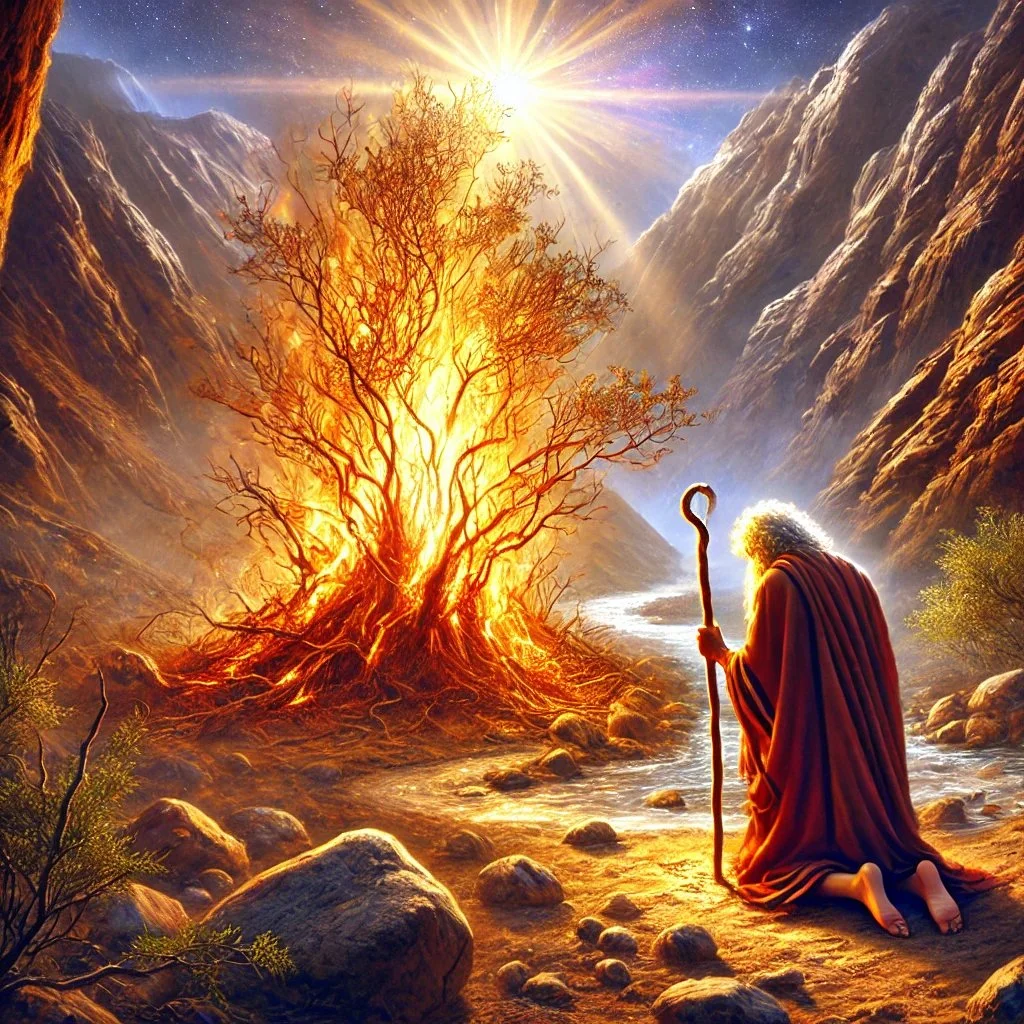The Burning Bush: A Story of God’s Presence and Power
It began in the wilderness, with a shepherd tending his flock. Moses, a man who once lived in Pharaoh’s courts, had fled to the desert and spent forty years in obscurity. But on this day, something extraordinary broke through the ordinary: a bush that burned with fire but was not consumed.
As Moses approached, a voice called to him: “Moses, Moses… Do not come any closer. Take off your sandals, for the place where you are standing is holy ground” (Exodus 3:4-5).
In that moment, the fire of the bush revealed God’s character. The flames showed His holiness, His self-existence, and His power. The fire burned, yet the bush was not consumed. It wasn’t just a fire to be seen—it was a fire that spoke, that revealed, and that called.
God told Moses that He had heard the cries of His people in Egypt and had come down to deliver them. And Moses, flawed and uncertain, was to be the one He would send. When Moses hesitated, questioning his worthiness, God assured him: “I will be with you” (Exodus 3:12).
Fire Throughout Scripture: God’s Presence Revealed
The burning bush was not the first or last time fire symbolized God’s presence. Centuries later, when God led Israel out of Egypt, He would appear as a pillar of fire by night (Exodus 13:21). That fire guided His people through the wilderness, a light in the darkness, a constant reminder that He was with them.
At Mount Sinai, fire and smoke descended upon the mountain as God gave His Law to Moses (Exodus 19:18). It was a terrifying display of His holiness and authority, a fire that marked the sacredness of His covenant.
But fire wasn’t just for guidance or awe—it also symbolized God’s refining power. The prophet Malachi described God as a refiner’s fire, purifying His people like gold or silver, burning away impurities to make them holy (Malachi 3:2-3).
Then, in the New Testament, fire appeared in a new way. On the day of Pentecost, tongues of fire rested on the disciples, and they were filled with the Holy Spirit (Acts 2:3-4). This fire didn’t consume or terrify—it empowered. It marked the presence of God, no longer in a bush or a pillar, but within His people.
Why Fire?
God’s choice of fire is deeply meaningful. Fire is both life-giving and dangerous. It provides warmth and light but can also destroy and refine. Fire reveals God’s dual nature: He is holy and righteous, a consuming fire who cannot tolerate sin (Hebrews 12:29), yet He is also near, guiding and sustaining His people.
The fire of the burning bush declared that God is eternal and self-sufficient—He does not need creation, yet He chooses to dwell among His people. The fire of the pillar showed that He is faithful to guide us through the wilderness. The fire of Pentecost reminds us that He equips and empowers us for His mission.
What This Means for Us Today
The story of the burning bush is not just about Moses—it’s about us. God still speaks, guides, and refines His people.
His Presence Sustains Us: Like the bush that burned but was not consumed, God sustains us through trials. When we walk through fire, we are not alone. As Isaiah says, “When you walk through the fire, you shall not be burned, and the flame shall not consume you” (Isaiah 43:2).
His Fire Refines Us: Just as gold is purified in the fire, God uses trials to shape us into His image (1 Peter 1:7). His holiness burns away what is impure, preparing us for His purposes.
His Spirit Empowers Us: The same fire that rested on the disciples at Pentecost is at work in us today, equipping us to share the Gospel and live boldly for Christ (Acts 1:8).
The God who revealed Himself to Moses in the burning bush is the same God who leads, refines, and empowers His people today. His fire may be awe-inspiring and even humbling, but it is also life-changing.
A Final Reflection
Imagine yourself in Moses’ place, standing before the burning bush. The fire is burning, and you hear God call your name. Like Moses, you might feel inadequate or unworthy. But the message of the burning bush is clear: it’s not about your ability—it’s about God’s presence.
He is still the great I AM (Exodus 3:14), unchanging and eternal, calling ordinary people to extraordinary purposes. His fire burns within us, lighting our path, refining our hearts, and empowering us to carry His presence into the world.
The fire that called Moses out of the wilderness still calls to us today. How is God calling you out of your wilderness?


